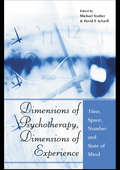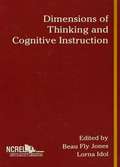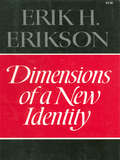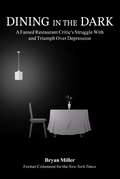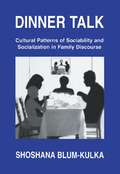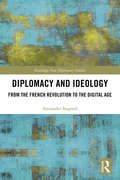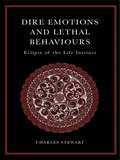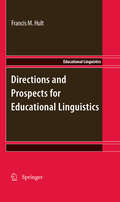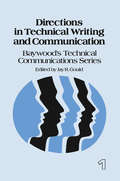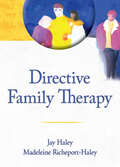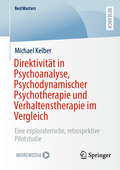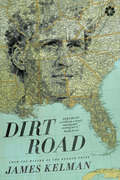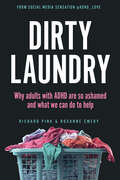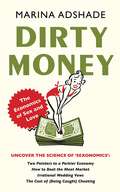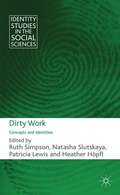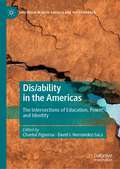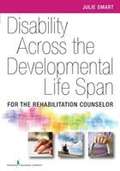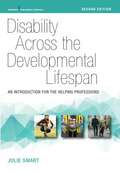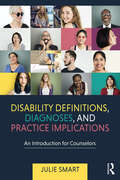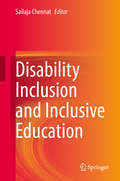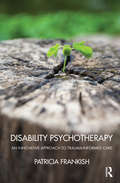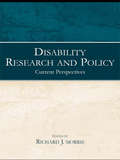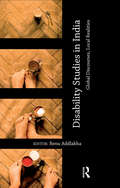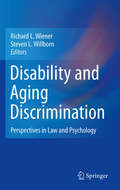- Table View
- List View
Dimensions of Psychotherapy, Dimensions of Experience: Time, Space, Number and State of Mind
by David E. Scharff Michael StadterHow do the fundamental elements of experience impact on the practice of psychotherapy?Dimensions of Psychotherapy, Dimensions of Experience explores the three basic elements of psychotherapy - time, space and number - summarising theory, setting it in context and bringing concepts to life with clinical illustrations.Michael Stadter and David Scharff bring together contributions describing how each of these elements, as well as their simple and direct manifestations in the physical world, also combine to form the psychological dimensions of symbolic reality both in the inner world and in the transactional world. They also reveal how, in encounters between patient and therapist, the combination of inner worlds form a new, uniquely psychological, fourth dimension that saturates the activity and experience of the other three elements. This book aims to increase our understanding of the action of the three dimensions of psychotherapy by looking at the elements that constitute the setting and process in which clinicians engage every day. The contributors, all of whom are experienced psychotherapists and psychoanalysts, connect their thinking on the dimensions to clinical practice by illustrating their ideas with case material and examining their impact on general treatment issues.This book will be useful to practicing psychotherapists and psychoanalysts and students of psychoanalysis and philosophy.
Dimensions of Thinking and Cognitive Instruction
by Beau Fly Jones Lorna IdolBy establishing a conceptual framework and a common language for educators to work together, this volume attempts to answer the challenge facing all teachers -- how can students improve the quality of their thinking? Methods of strengthening the thought process include: helping students learn to monitor their attention and commitments; asking questions that require students to organize, analyze, and integrate information; setting tasks that involve complex processes such as problem solving and research; and modeling and reinforcing fair-mindedness.
Dimensions of a New Identity
by Erik H. EriksonThe two lectures presented in this important volume were delivered by Erik H. Erikson at the second annual Jefferson Lectures in the Humanities, sponsored by The National Endowment for the Humanitites. In the first lecture, entitled "The Founders: Jeffersonion Action and Faith," Erikson uses selected themes from Jefferson's life to illustrate some principles of psychohistory. In the second lecture, "The Inheritors: Modern Insight and Foresight," Erikson applied his main concepts to the problems of ongoing history. The title of the lectures contains one such concept. "New identity" is the result of radical historical change and is here meant to characterize the emerging American identity as first embodied in such men as Jefferson. Erikson first explores certain themes in his examination of the emerging American identity during Jefferson's time. He then attempts to relate the Jeffersonian themes to contemporary problems of repression and suppression, of moralistic vindication, and true liberation by insight. Finally, Erikson maintains that now that children will be born by the privileged choice of parental persons, an adult environment fitting the living and the to-be-living becomes an ethical necessity. There is no question that this work ranks among Erikson's most challenging and seminal books.
Dining in the Dark: A Famed Restaurant Critic's Struggle with and Triumph over Depression
by Bryan MillerThe Rise and Fall of the World&’s Most Powerful Restaurant Critic and His Battle with Severe, Debilitating Depression From the early 1980s to the mid-1990s, Bryan Miller was a household name among restaurant goers in the greater New York City area and beyond as the restaurant critic for the New York Times, as well as the author of numerous books, a public speaker, and a radio and television commentator. Over ten years as a columnist, he dined out more than five thousand times in the United States and abroad, from haute to humble. The Wine Spectator, in a front-page profile, declared Miller &“the most powerful restaurant critic in America.&” And for much of that time, he wanted to die.Dining in the Dark chronicles Miller&’s battle with Bipolar II disorder, also known as depression, which ruined his life, professionally and personally. Depression was directly responsible for his surrendering the New York Times restaurant column and, shortly thereafter, leaving the paper altogether. Everything he had worked for so diligently, rising from cub reporter to big-city columnist in less than a decade, vanished. In the ensuing years, unable to work, he lost his home, his life savings, two wonderful wives, the chance to have a family, and numerous friends and colleagues. He became increasingly reclusive; like many victims of serious depression, he reached the point where he was afraid to answer the phone. Pile on a brain tumor, electroshock therapy, a near-fatal bout with Lyme disease, accidental drug overdoses (he was once carried out of the newsroom on a gurney), and you have a life in shambles.Dining in the Dark tells the story of Miller&’s battle, but it also brings hope by sharing his journey to coping with, and finally conquering, his depression. The coping mechanisms he employed in order to get through the day will be of benefit to those in need of a helping hand. Dining in the Dark is philosophical, inspirational, educational, and even humorous at times. And, of course, there are lots of inside-the-New York Times anecdotes, as well as lots of food, wine, travel, and celebrity.
Dinner Talk: Cultural Patterns of Sociability and Socialization in Family Discourse
by Shoshana Blum-KulkaDinner Talk draws upon the recorded dinner conversations of, and extensive interviews with, native Israeli, American Israeli, and Jewish American middle-class families to explore the cultural styles of sociability and socialization in family discourse. The thesis developed is that family dinners in Western middle-class homes fulfill important functions of sociability for all participants and, at the same time, serve as crucial sites of socialization for children through language and for language use. The book demonstrates the way talk at dinner constructs, reflects, and invokes familial, social, and cultural identities and provides social support for easing the passage of children into adult discourse worlds. Family discourse at dinner emerges as a particularly rich site for discursive socialization and a highly meaningful enactment of sociable behavior in culturally patterned ways. Although all the families studied have a commom Eastern European background, Israeli and Jewish American families are shown to differ extensively in their interactional styles, in ways that enact historically different, community-related interpretations of the dialectics of continuity and change. Native Israeli, American Israeli, and Jewish American families differ culturally in the ways they negotiate issues of power, independence, and involvement through various speech activities such as the choice and initiation of topics, conversational story-telling, naming practices, metapragmatic discourse, politeness strategies, and in immigrant, bilingual families, language choice and code switching. Dinner Talk demonstrates the unique interactional style of each of the groups, linking the observed communication patterns to the ideological, sociocultural, and historical contexts of their respective communities.This innovative study of family discourse from a cross-cultural perspective will appeal to students and specialists in sociolinguistics, communication, anthropology, child language, and family and Jewish studies, as well as to all interested in patterns of communication within families.
Diplomacy and Ideology: From the French Revolution to the Digital Age (Routledge New Diplomacy Studies)
by Alexander StagnellThis innovative new book argues that diplomacy, which emerged out of the French Revolution, has become one of the central Ideological State Apparatuses of the modern democratic nation-state. The book is divided into four thematic parts. The first presents the central concepts and theoretical perspectives derived from the work of Slavoj Žižek, focusing on his understanding of politics, ideology, and the core of the conceptual apparatus of Lacanian psychoanalysis. There then follow three parts treating diplomacy as archi-politics, ultra-politics, and post-politics, respectively highlighting three eras of the modern history of diplomacy from the French Revolution until today. The first part takes on the question of the creation of the term ‘diplomacy’, which took place during the time of the French Revolution. The second part begins with the effects on diplomacy arising from the horrors of the two World Wars. Finally, the third part covers another major shift in Western diplomacy during the last century, the fall of the Soviet Union, and how this transformation shows itself in the field of Diplomacy Studies. The book argues that diplomacy’s primary task is not to be understood as negotiating peace between warring parties, but rather to reproduce the myth of the state’s unity by repressing its fundamental inconsistencies. This book will be of much interest to students of diplomacy studies, political theory, philosophy, and International Relations.
Dire Emotions and Lethal Behaviours: Eclipse of the Life Instinct
by Charles StewartDire Emotions and Lethal Behaviours explores the primary motivational system in human beings. Based on the work of C. G. Jung, James Hillman, Louis Stewart and Silvan Tomkins, Charles Stewart investigates the psychology of the innate affects, with a focus towards the emotional motivation of adolescents and young adults who have killed others, themselves, or both. It is suggested that social isolation, dissociation of the personality, unbearable emotions, and possession by affects are necessary conditions for both homicide and suicide. Stewart argues that these conditions result from deep-seated emotional psychopathology which involves both the positive affects of the life instinct - Interest and Joy, and the crisis affects - Fear, Anguish, Anger, and Shame/Contempt. Illustrated throughout with case studies of individuals who have committed homicide, suicide, or both, Dire Emotions and Lethal Behaviours aims to discover the emotional motivations for such behaviours so that through education and psychological treatment, such tragic outcomes can be prevented. This book will be of interest to professionals and students in the fields of mental health and criminal justice.
Directions and Prospects for Educational Linguistics
by Francis M. HultDirections and Prospects for Educational Linguistics explores innovations that have developed from the creative syntheses of diverse methodological and theoretical approaches used to explore a broad rang of issues and topics related to language (in) education. The volume provides unique insights into current practices and new frontiers for educational linguistics by bringing together contributions from scholars who draw upon on established research traditions while at the same time pushing their boundaries beyond the confines of specific disciplines. Each paper serves as a thought provoking starting point for scholars and advanced graduate students to contemplate directions and prospects for research that contributes to linguistically appropriate and socially responsible education.
Directions in Technical Writing and Communication
by Jay R GouldTeachers of technical writing are frequently handicapped by a lack of material to back up discussions in the classroom and in textbooks. This title helps to overcome this weakness.
Directive Family Therapy
by Jay Haley Madeleine Richeport-HaleyDirective family therapy pioneer Jay Haley and Madeleine Richeport-Haley explain their innovative techniques for solving problems Directive Family Therapy is the final work of a widely recognized giant in the international family therapy field. This text is the pre-eminent state-of-the-art sourcebook on practical, innovative techniques to effectively solve problems throughout the life cycle stages. Directive family therapy pioneer Jay Haley, PhD(who passed away in 2007), and, Madeleine Richeport-Haley, PhD provide practitioners with creative directives to clearly identify problems, formulate well-designed treatment plans, and then successfully carry them out to achieve lasting therapeutic change. This essential text explores fascinating case studies illustrating the powerful, highly effective problem solving directives. The work is extensively referenced, and includes a full and complete bibliography of Haley's published works and a list of the authors' collaborative films. Directive Family Therapy presents highly instructive, revelatory stories about working with real life clients and provides dynamic, innovative, and oftentimes surprising solutions to a wide range of specifically detailed problems and clinical issues. All stages and issues in the life cycle are addressed, including birth, child development, raising children, problems in adolescence, becoming a couple, aging, and retirement. Also included is a detailed appendix containing a variety of poignant, insightful interviews featuring Haley's reflections on the early years of practice and the development of directive family therapy. Problem areas addressed in Directive Family Therapy include: firesetting bedwetting fear of dogs violent behavior teenage rebellion incest drugs panic attacks abuse fights within couple relationship eating disorders alcohol abuse affairs sexual shyness within a couple relationship shoplifting and more Directive Family Therapy is invaluable for mental health professionals of every experience level, and is a useful family therapy resource for educators and students in MFT programs and psychology--and a fitting and poignant memoir to the work of a profoundly gifted family therapist.
Direktivität in Psychoanalyse, Psychodynamischer Psychotherapie und Verhaltenstherapie im Vergleich: Eine exploratorische, retrospektive Pilotstudie (BestMasters)
by Michael KelberIn diesem Buch wird eine saturierte Skala zur Messung der Lenkungsintensität von Psychotherapeut*innen entwickelt und auf Transkripte aus psychoanalytischen, psychodynamischen und verhaltenstherapeutischen Sitzungen angewendet. Erste Ergebnisse deuten auf unterschiedliche Lenkungsmuster zwischen den Verfahren sowie auf Zusammenhänge mit Symptomveränderungen hin. Die Arbeit liefert einen methodischen Beitrag zur Prozessforschung und eröffnet Perspektiven für weitere Anwendung und Validierung.
Dirt Road: A Novel
by James KelmanBooker Prize winner James Kelman's new novel, Dirt Road, tells the story of a teenage boy who travels with his father from Scotland to Alabama to visit with relatives after the death of his mother. In the American South, he becomes swept up into the world of zydeco and blues. ""A powerful meditation on loss, life, death, and the bond between father and son. . . . Kelman has created a fully–realized, relatable voice that reveals a young man’s urgent need for connection in a time of grief." —Publishers Weekly (starred review) After his mother’s recent death, sixteen–year–old Murdo and his father travel from their home in rural Scotland to Alabama to be with his émigré uncle and American aunt. Stopping at a small town on their way from the airport, Murdo happens upon a family playing zydeco music and joins them, leaving with a gift of two CDs of Southern American songs. On this first visit to the States, Murdo notices racial tension, religious fundamentalism, the threat of severe weather, guns, and aggressive behavior, all unfamiliar to him. Yet his connection to the place strengthens by way of its musical culture. Murdo may be young but he is already a musician.While at their relatives’ home, the grieving father and son experience kindness and kinship but share few words of comfort with each other, Murdo losing himself in music and his reticent and protective dad in books. The aunt, “the very very best,” Murdo calls her, provides whatever solace he receives, until his father comes around in a scene of great emotional release.As James Wood has written of this brilliant writer’s previous work in The New Yorker, “The pleasure, as always in Kelman, is being allowed to inhabit mental meandering and half–finished thoughts, digressions and wayward jokes, so that we are present” with his characters. Dirt Road is a powerful story about the strength of family ties, the consolation of music, and one unforgettable journey from darkness to light.
Dirty Laundry: Why Adults with ADHD Are So Ashamed and What We Can Do to Help
by Richard Pink Roxanne EmeryAn empowering and witty guide to banishing shame and living your fullest life with ADHD—plus tips for loved ones on helping them navigate this world, too—from viral duo ADHD_Love. What if you stopped feeling ashamed of constantly being late or of getting so hyperfocused on a task that you drop everything else you had to do? How can you as a partner, parent, or friend better understand your neurodivergent loved one&’s way of moving through the world? In Dirty Laundry, life partners Rich Pink and Rox Emery unapologetically guide you through the ups and downs of life with ADHD. Every chapter starts with a common symptom of ADHD, like impulsivity or struggles with finances, and an earnest moment from their own lives to show you how they navigate the symptom together. Rox reminds you to be kind to yourself and love yourself for who you are; Rich offers tips on how he uses compassion and honesty instead of jumping to conclusions. Whether it's helping your ADHDer with friendly time-checks before an appointment or reminding yourself to take breaks during hours spent hyperfocusing on a new project, Rox and Rich give you the tools to destigmatize and normalize life with ADHD.
Dirty Money: The Economics of Sex and Love
by Marina AdshadeIn this witty and revelatory investigation of the so-called dismal science, University of British Columbia professor Marina Adshade skips the usual widgets and uncovers how the market comes to bear on our most intimate decisions: sex, dating, courtship, love, marriage, even breaking up. The science of 'sexonomics' is born: How much money does an ugly guy need to have to attract as many women via an online dating site as a hot man? Is modern marriage just an opportunity to consume more goods and services? Does raising the price of beer reduce risky sex? Why does a spike in the sale of sex toys predict an upcoming recession, while an increase in the number of breast lifts indicates a perkier economy is on the way? Which comes first: a prosperous nation or a promiscuous one? Once you read Dirty Money, you'll never look at your money - or your relationships - the same way again
Dirty Work
by Ruth Simpson Natasha Slutskaya Patricia Lewis Heather H�pflThis book explores understandings and experiences of 'dirty work' - tasks or occupations that are seen as disgusting and degrading. It complicates the 'clean/dirty' divide in the context of organizations and work and illustrates some of the complex ways in which dirty work identities are managed.
Dis/ability in the Americas: The Intersections of Education, Power, and Identity (Education in Latin America and the Caribbean)
by Chantal Figueroa David I. Hernández-SacaThis edited volume highlights the rich and complex educational debates around Critical Disability Studies in Education (DSE), critical mental health, and crip theories. Chapter authors use the term Dis/ability to criticize aspects of education research and international development that do not center the experiences of dis/abled students and people with dis/abilities. Through case studies from around the Americas, chapters highlight how top-down approaches to disabilities further oppress rather than emancipate. The volume prioritizes the spaces of resistance where local initiatives speak back to the demands imposed by an ever-globalizing world shaped by colonialism and imperialism, undergird by intersectional ableism. Voices of disabled students and people with dis/abilities counter-narrate the personal, interpersonal, structural, and political ways in which biomedical and psychological models of disability have impacted their well-being throughout education and society in the Americas. Through a critical sentipensante approach that centers the “epistemologies of the south,” this volume challenges global mental health and dis/ability hegemony in the Americas.
Disability Across The Developmental Life Span: For The Rehabilitation Counselor
by Julie SmartThis is the only text to provide comprehensive coverage of human growth and development, a requirement mandated by the Council of Rehabilitation Education (CORE) for a master's degree in rehabilitation counseling and for Licensed Professional Counselor certification. Written by an eminent leader in the field of disability studies, this volume reflects a significant change in perceptions of individuals with disabilities from being defined foremost by their disability to being viewed as normal individuals with a disability. It provides an understanding of traditional human growth and development that will enhance the practice of disability counseling by enabling an understanding of a client's childhood and prior life experiences. <p><p> The book begins with a focus on developmental theories and tasks, followed by a discussion of cultural and ethical considerations in human development. It considers the major theories of human development as they relate to people with and without disabilities, and career theories with a focus on the concept of choice. The book addresses specific developmental stages including a description of developmental tasks, risks, disability applications, specific disabilities common to a particular stage, and cultural and ethical issues, all supported by case examples.
Disability Across the Developmental Lifespan
by Julie SmartThis is the only text to examine the experience of disability in relation to theories of human growth and development. It provides a foundational and comprehensive examination of disability that encompasses the intellectual, psychiatric, physical, and social arenas. The second edition is updated to underscore its versatility as an introductory text about the developmental tasks of people with disabilities for all the helping professions. Reorganized to illuminate the book’s interdisciplinary focus, it includes new demographics, new case studies and first-person accounts, discussions on cultural aspects of disabilities, family concerns, and more. The text delivers practice guidelines for each of the conventional life stages and describes the developmental tasks of individuals with disabilities (IWDs). It emphasizes the positive trend in the perception of IWDs as normal and underscores the fact that IWDs have the same motivations, emotions, and goals as those without disabilities. Learning activities, suggestions for writing exercises, and websites for further study reinforce learning, as do graphs and charts illustrating trends and demographics.
Disability Definitions, Diagnoses, and Practice Implications: An Introduction for Counselors
by Julie Smart<p>This introductory text defines and describes disability, while providing concrete practice guidelines and recommendations for students in the fields of counseling, social work, and the helping professions. Various specialty areas are explored in detail, including marriage and family counseling, adolescent counseling, addictions counseling, LGBTQ concerns, multicultural counseling, and career counseling. <p>The first three chapters lay the foundations by discussing the demand for counseling services by individuals with all types of disabilities; presenting clinical, legal, medical/biological, and personal definitions of disability; and describing physical, cognitive, and psychiatric disabilities. Next, author Julie Smart examines core beliefs about disability using a range of first-person accounts from experienced counselors. The last six chapters focus on practice guidelines for various aspects of disability—including ethical considerations, societal issues, social role demands, and individual responses—and consider new possibilities for disability counseling professions. <p>With rich case studies woven throughout, as well as valuable information on client needs, disability categorizations, and key Models of Disability, this essential textbook will be useful not only to counseling students but also to professional counselors, social workers, and psychologists.</p>
Disability Inclusion and Inclusive Education
by Sailaja ChennatThe book approaches the topic of disability, inclusion and inclusive education in a holistic way including both academic and psycho-social perspectives. It also focuses on the contemporary status of disability studies with a multidisciplinary dimension. The experiences and challenges of children with disabilities and the different dimensions of inclusive education have been situated appropriately by including at the outset, a chapter on 'Disability Studies: The Context'. Chapter on 'Sociology of Disability' accentuates the tone and perspective of the presentations of the authors and editor. The research findings presented in the book indicate grounded realities and suggestions for transactional strategies which are plausible in the Indian context. It has never been timely to publish a book that helps professionals who work with schools, special education teachers, and counsellors to analyze disabilities from a socio-psychological perspective keeping the protagonist at the centre. Case narrations situated in the Indian context enrich the presentations giving voice to the marginalized children/adults with disabilities. This work serves as a comprehensive reference for the most prevalent disabilities at school education level covering the conceptual understanding about each disability, their psycho-social perspectives, implications for classroom transactions, suggestions of transactional strategies along with a brief explanation of assistive technology that can be used in case of each disability.With Right to Education Act (2009) in place, a diverse range of readers, from special educators and other teachers in schools, prospective teachers pursuing their pre service teacher education programmes, teacher educators and researchers in the field of disabilities and inclusive education will all find this volume useful, as a reference material with long shelf life.
Disability Psychotherapy: An Innovative Approach to Trauma-Informed Care
by Patricia FrankishMuch has been written about cognitive development in those who are cognitively impaired. Much is written about attachment for people who don't have disabilities. Yet people with disabilities have suffered discrimination and neglect of their emotional needs, perhaps because the pain of difference cannot be tolerated, perhaps because of lack of will or lack of knowledge. This book aims to help to fill the knowledge gap and to encourage others to overcome their resistance to facing the pain, and will be an important contribution to our understanding of the world of disability and emotional deprivation. In this book - a result of over twenty years experience with people who have disabilities and additional distress as a result of traumatic life experiences - an attempt is made to bring together what we know about early emotional development and the consequences of failure to provide an emotionally nurturing experience, and the results are then applied to people with disabilities.
Disability Research and Policy: Current Perspectives
by Richard J. MorrisThis book is based on research and scholarship produced by the Meyerson Disability Research Project (MDRP) at the University of Arizona. Its chapters are divided into two major sections: 1) Disability Research Areas and 2) Disability Policy Areas. The first section addresses some relatively new areas of research and scholarship with adults and children, such as the use of technology (e.g., videoconferencing and computer technology) in service delivery, whereas the second section critically examines various public policy and legal areas that impact the daily lives of many persons having a disability.
Disability Studies in India: Global Discourses, Local Realities
by Renu AddlakhaSince the 1970s, the international disability rights movement, the United Nations and national governments across the world have attempted to ameliorate the status of the disabled population through a range of legislative and policy measures primarily in the areas of health, education, employment, accessible environments and social security. While the discourse in the disability sector in India has shifted from charity and welfare to human rights and entitlements, disability studies — as an interdisciplinary academic terrain that focuses on the contributions, experiences, history and culture of persons with disabilities — has not yet taken root.This volume collates some of the most recent pioneering work on disability studies from across the country. The essays presented here engage with the concept of disability from a variety of disciplinary positions, sociocultural contexts and subjective experiences within the overarching framework of the Indian reality. The contributors — including some with disabilities themselves — provide a well-rounded perspective, in shifting focus from disability as a medical condition only needing clinical intervention to giving it due social and academic legitimacy.This book outlines key issues that would be germane to any disability studies endeavour in India and South Asia, and will appeal to academics, activists, institutions, laypersons and professionals involved in social welfare, sociology, disability studies, women’s studies, psychiatry, rehabilitation, and social and preventive medicine.
Disability and Aging Discrimination
by Steven L. Willborn Richard L. WienerTwo things are certain in the contemporary workplace: the aging of employees, and negative attitudes toward them - especially those with disabilities--by younger colleagues and supervisors. Yet related phenomena seem less clear: how do negative stereotypes contribute to discrimination on the job? And how are these stereotypes perceived in legal proceedings? Bringing theoretical organization to an often unfocused literature, Disability and Aging Discrimination offers research in these areas at the same level of rigor as research into racial and gender discrimination. The book applies Social Analytic Jurisprudence, a framework for testing legal assumptions regarding behavior, and identifies controversies and knowledge gaps in age-discrimination and disability law. Chapters provide historical background or present-day context for the prevalence of age and disability prejudices, and shed light on the psychosocial concepts that must be understood, in addition to medical considerations, to make improvements in legal standards and workplace policy. Among the topics covered: * Applying Social Analytic Jurisprudence to age and disability discrimination. * The psychological origins and social pervasiveness of ageism. * Growing older, working more: the boomer generation on the job. * Limitations of the Americans with Disabilities Act. * Disability and procedural fairness in the workplace. * Cross-cultural perspectives on stigma. The first volume of its kind, Disability and Aging Discrimination is essential reading for researchers, forensic and rehabilitation psychologists/psychiatrists, and those involved in the well-being of older and disabled workers.
Disability and Discourse
by Val WilliamsDisability and Discourse applies and explains Conversation Analysis (CA), an established methodology for studying communication, to explore what happens during the everyday encounters of people with intellectual disabilities and the other people with whom they interact.Explores conversations and encounters from the lives of people with intellectual disabilitiesIntroduces the established methodology of Conversation Analysis, making it accessible and useful to a wide range of students, researchers and practitionersAdopts a discursive approach which looks at how people with intellectual disabilities use talk in real-life situations, while showing how such talk can be supported and developedFollows people into the meetings and discussions that take place in self-advocacy and research contextsOffers insights into how people with learning disabilities can have a voice in their own affairs, in policy-making, and in research
